Recently I met an amazing car electrician who fixed my van electric issues and also took the time to teach me about it.
I'm writing this post for two reasons: As a reminder to myself and in the hope to help whoever has a van and didn't make the electric system by his/herself and have no car electric knowledge.
The context:
I bought my van converted by a manufacturer.
I bought it from its 4th owner which means some stuff was modified during the years and mostly, lots of information got lost in the time.
Therefore I had no clear idea how various stuff works in my van, mostly stuff related to the electric system.
The wires are all properly implemented in the van's wall and therefore I cannot see them (unless I open the whole insulation layer which is rather big work to do).
I had minor issues like the battery not charging fast enough or discharging very quickly.
I did my research online but the information I found is mostly very beginner's level (explanation of wires, battery, and alternator) or quite advance like how to build your own van electric system, which is an overwhelming amount of information.
I ended up thinking the electric system is too hard for me to understand.
I decided to go to a specialist.
What I needed is a car electrician. Not a mechanic, the mechanic doesn't know much about electricity. First lesson learned.
I discover is not easy to find an electrician for the van. Most car electricians have no idea about solar panel systems or any of the internal amenities of a camper. Many of them don't even want to deal with this stuff so they just told me they cannot help me.
Finding a van/camper electrician specialist is rather hard.
In Berlin, I found just one. And Berlin is the city of van's lover!!
Maybe I don't know how to search them properly, could be.
Anyway, I ended up going to a random car electrician which had a quick look at my batteries and told me they were in ok status so all should work well.
They didn't even check the wires or the fuses!
Lesson to learn for me: Don't trust the work of an expert just because is called an expert in the field. Keep inquiring and checking if the problem is gone.
I met other travelers in the same situation.
In particular now with Corona situation, lots of people bought a second-hand van. These vans are often custom-made by some third person (not manufacturer) or had different modifications over the years.
I, therefore, thought what I found out could be useful to others too.
Assumption before reading this post:
- I assume some understanding of how a car battery is loaded and how it works. If not, read here: https://www.firestonecompleteautocare.com/blog/batteries/your-cars-electrical-system/
- I assume a minimum understanding of electrics like how current is transmitted around the car. If not, here is a link to help out: https://www.vegoilguy.co.uk/auto_electrics_101.php
My van electric problems
The problems I had in my van were:
- Board battery discharge very quickly
- Board battery not loading while driving
- I installed the solar panel system myself, following youtube videos. I was always unsure if what I built works well together with the manufacturing electric system.
I must say, it was already hard to detect those problems.
For example about battery discharge quickly and not loading while driving: For a long time I thought the problem was the fridge consuming too much.
Talking with other people, I got so many different inputs that confuse me even more. Some told me a fridge in a camper can work just if is powered by gas. Others told me that nowadays a fridge can go without gas without problems, others told me a fridge can go with electricity but just while driving... I still don't know what is correct but all those Infos put me on the wrong tracks for a long time.
In the end, I used the old good method of Divided and Conquer, I stop my fridge and realise the battery was discharging quickly also without the fridge running.
Ok, the problem is mostly the battery or how the battery is wired.
Useful van electric basics I learned
The car electric system is mostly made of wires, fuses, and relays.
Wires are the ones that send current.
About wires:
- They have to be the same size. If there is a need to attach two wires, the two must have the same diameter, otherwise, there is a loss of power. An that can make the difference!
- Shorter the distance between the two amenities, the less loss of power there is.
- Fewer wires joining, the better. If possible, try always to have one cable that goes from beginning to end.
- Avoid manually twist two wires together. It will work but every vibration will make them connect and disconnect and that's really bad for the battery or whatever else is connected to them.
Always stick use approved connector. There are different ways to do it, most of them are valid but don't knot them and close them with tape. This is bad. In vans in particular because of the vibration while driving or moving inside the van.
Here is an idea of how to connect wires properly: https://www.galvinpower.org/best-wire-connectors - The connector between two wires or between wires and battery or other appliance must be very tight! I thought "ok tight" was enough but nope, must be very very tight. I should close it with a proper tool like a wrench or a clamp, for the same above reason: vibration.
- Every connector (connection used to connect the wires to the battery or appliance) must be clean. Rust or any kind of dirt will not make the current flow properly.
- The plus or red cable should never touch the earth ground. Not even close to it (again because of vibration can seem that it doesn't touch the ground but while driving it will touch it.)
About fuse and relay:
Not so much to says here except, remember to always check them! Something isn't working properly? Check that any fuse didn't blow up. Same for the relay. To check if a relay is working, check for continuity with a multimeter. If you have no idea what is that, check here: https://youtu.be/TdUK6RPdIrA?t=283
By the way, I recommend anyone with a van to have a multimeter and learn how to use it.
About Battery:
When there is a battery problem - the battery is dead, the car start with difficulties or the battery discharge quickly - most of the people give the suggestion to change the battery.
This is not always the solution (or the problem in itself). I would suggest checking wires, fuses, and so on before changing the battery. In particular, if the battery is not so old.
Batteries have a lifetime of 5 years (if kept in good condition) so don't rush to change your battery, the problem might be somewhere else.
- Battery needs to have clean plus and minus. If it is rusty or dirty it will not send the current properly
- 12v battery status: Below 12v the battery is empty.
Above 12v till 12.9v the battery is charged (at 12.9v is fully charged). Above 13v the battery is in charging mode. - In my car, the board battery never discharges the starter battery. And the other way around. That was very important for me to know.
What to check on van's electric system:
- Check the battery status: How old it is and how clean it is.
- Be sure that every contact point between wires is clean and really tightened up.
- Each cable that goes to the battery, must have a fuse to protect the battery from overcurrent. Here is an explanation about fuse: https://www.easycarelectrics.com/car-fuse-guide
- Check that the two batteries have an alternator. The alternator is the one that allows batteries to be charged while driving. Be sure the alternator works for both batteries, start and board battery.
Even if you have a solar panel installed, you want to charge both your batteries when driving. - Be sure that none of the batteries can discharge the other one when empty. I.e. If my board battery is empty and I try to use the fridge, it will not take energy from the start battery.
- Buy a multimeter! And learn how to measure: voltage, resistance, and continuity. There are plenty of youtube videos about it.
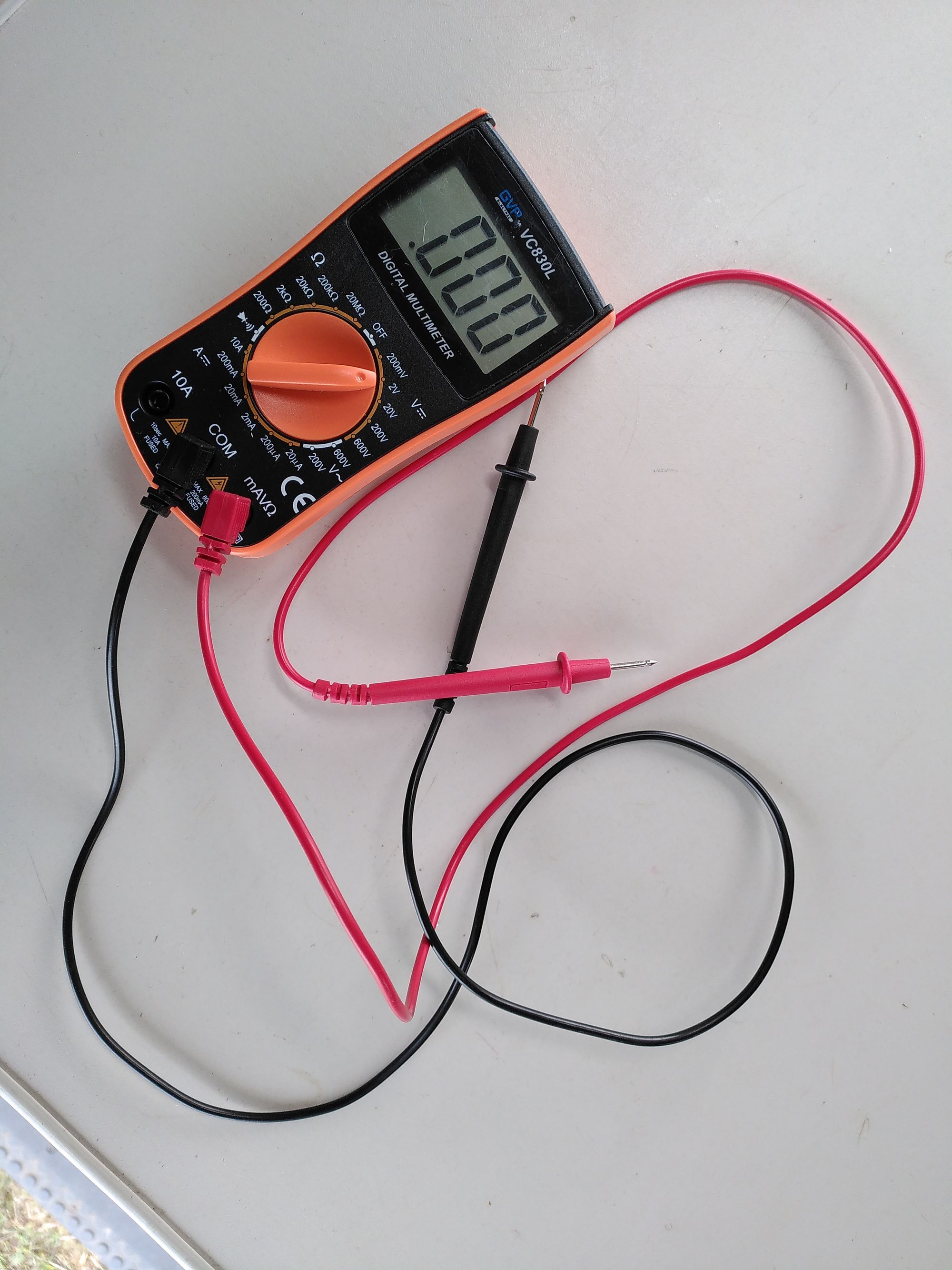
Checklist to spot electric problems in a van:
As a reminder to myself for the next time I have an electric problem in the van, here is my checklist:
- Check batteries voltage. Is it empty? (less than 12v)
- Check wires voltage. Is there current running?
- Check fuses. Are there any blow-up fuses?
- Check wires and contact points status. Are they well tight up? Is there any rust or dirt on it?
- Run engine: is battery charging? Both of them are?
- Divided and conquer. Is it a solar panel system problem? Is battery problem? Which battery? Is it a fuse? What if I turn off all the electric appliances? Is it a solar panel controller problem?
Last but not least, if headlights are weak or the car has often problem to start, there is likely an electric system problem.
Here is a detailed list of signs to keep an eye on: https://www.ridetime.ca/blog/the-5-most-common-signs-that-your-cars-electrical-system-is-failing/
About energy consumption in a van
I don't want to spend too much time on this topic since there are many guides online on how to calculate a van's energy consumption and I judge them to be way more complete than what I could ever write. I just want to share my personal experience.
Is not much fun (hey, I just want to hit the road asap!) but I really recommend taking a bit of time to understand how watt, voltage, and amper works and how to calculate those.
I still struggle with it so every time I learn something about my van electric system or my appliance, I write it down in a book which I check whenever something is wrong.
Most important is to understand properly how much you consume on average daily.
Of course, is easier when you already live in the van.
Even if you don't live in the van yet or are looking to buy one, you can start making a table of your consumption.
Is annoying but will pay off later on!
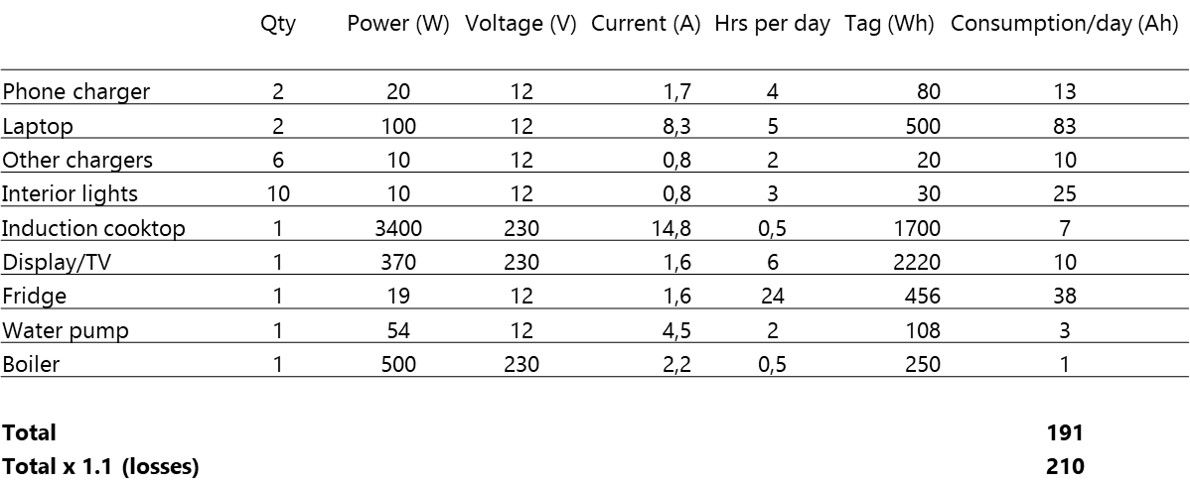
In my case I have:
- fridge
- I charge my phone on average 2 times a day
- I charge my laptop one time a day.
- I use the water pump to wash dishes and occasionally to shower (average 1h a day or less).
- In winter I occasionally use the heater (mine works with gas but needs the energy to start off).
My fridge uses 4 amper/hour.
I have a 100 amper battery.
If I keep my fridge running all day which is 24 hours, I will use it just for the fridge: 4 amper x 24 hours -> 96 ampers.
This is basically all my battery storage since the battery never gets 100% discharge.
Therefore I cannot keep my fridge running all the time.
What I usually do, is turn it off in the night. Turn it on while driving.
If I stay in a place for longer (so no driving) and there is a good sun, I turn it on for 5/7 hours a day. If there is no sun, I turn it on for 3/4 hours max.
Usually, no sun also means cold so there is no need to have a fridge running all the time anyway.
Reading online about van energy consumption was always very confusing to me.
An amazing tool to calculate your energy consumption is: https://faroutride.com/van-electrical-calculator/
Still, I would recommend taking your time and read a comprise guide. If it is very confusing like it is to me, try finding simpler information but don't give up.
You can and will understand it (if I did it, everybody can!) and it will pay off! There is nothing better than living in a van confidently knowing what is working and how.
Here is a super detailed guide about electric van systems: https://faroutride.com/electrical-system/
For me this is a bit too much, in particular at the beginning I wasn't able to understand most of it and it made me feel overwhelmed.
So I prefer to start with something like this: https://mowgli-adventures.com/camper-van-electrics-explained/#overview
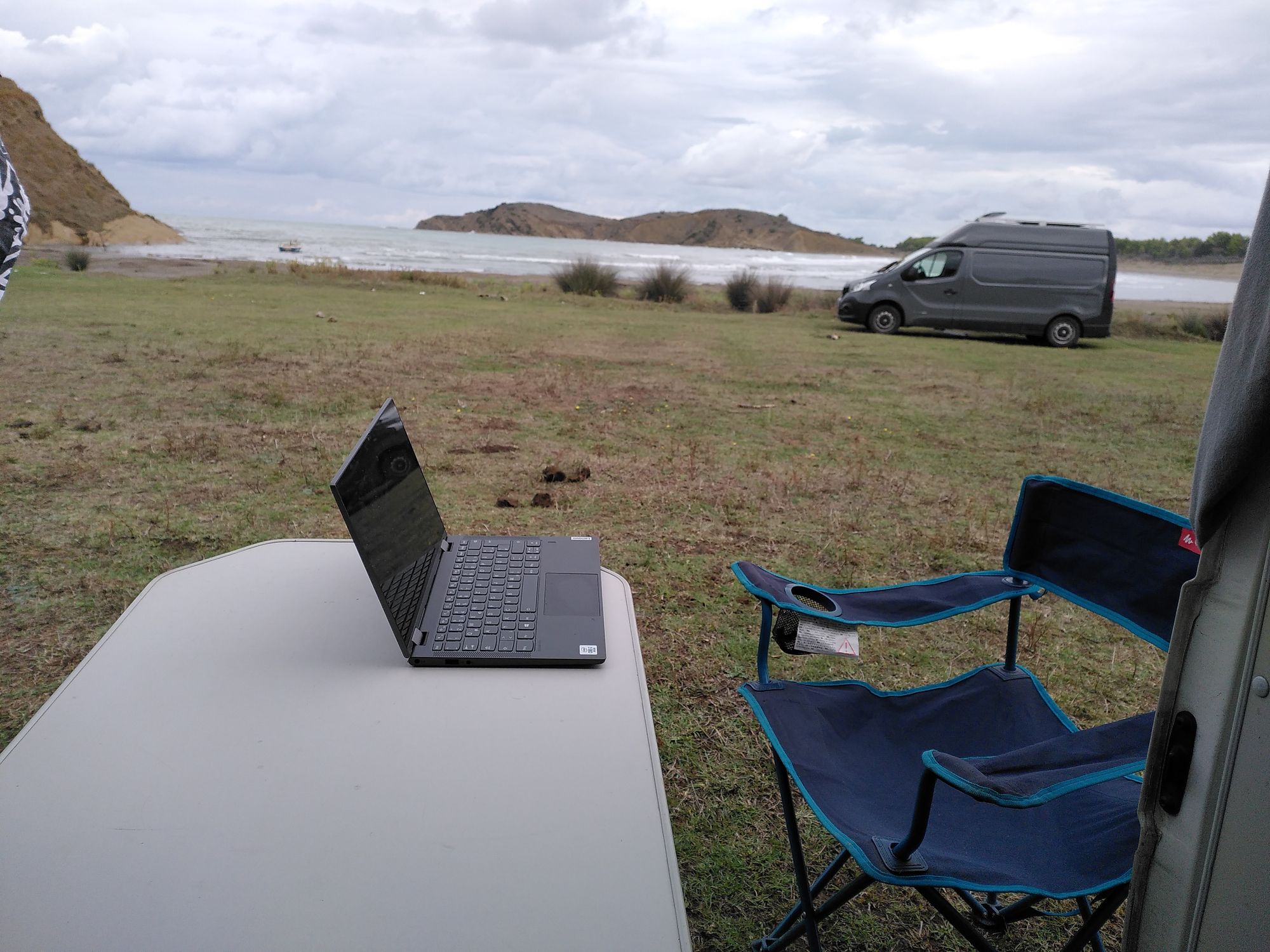
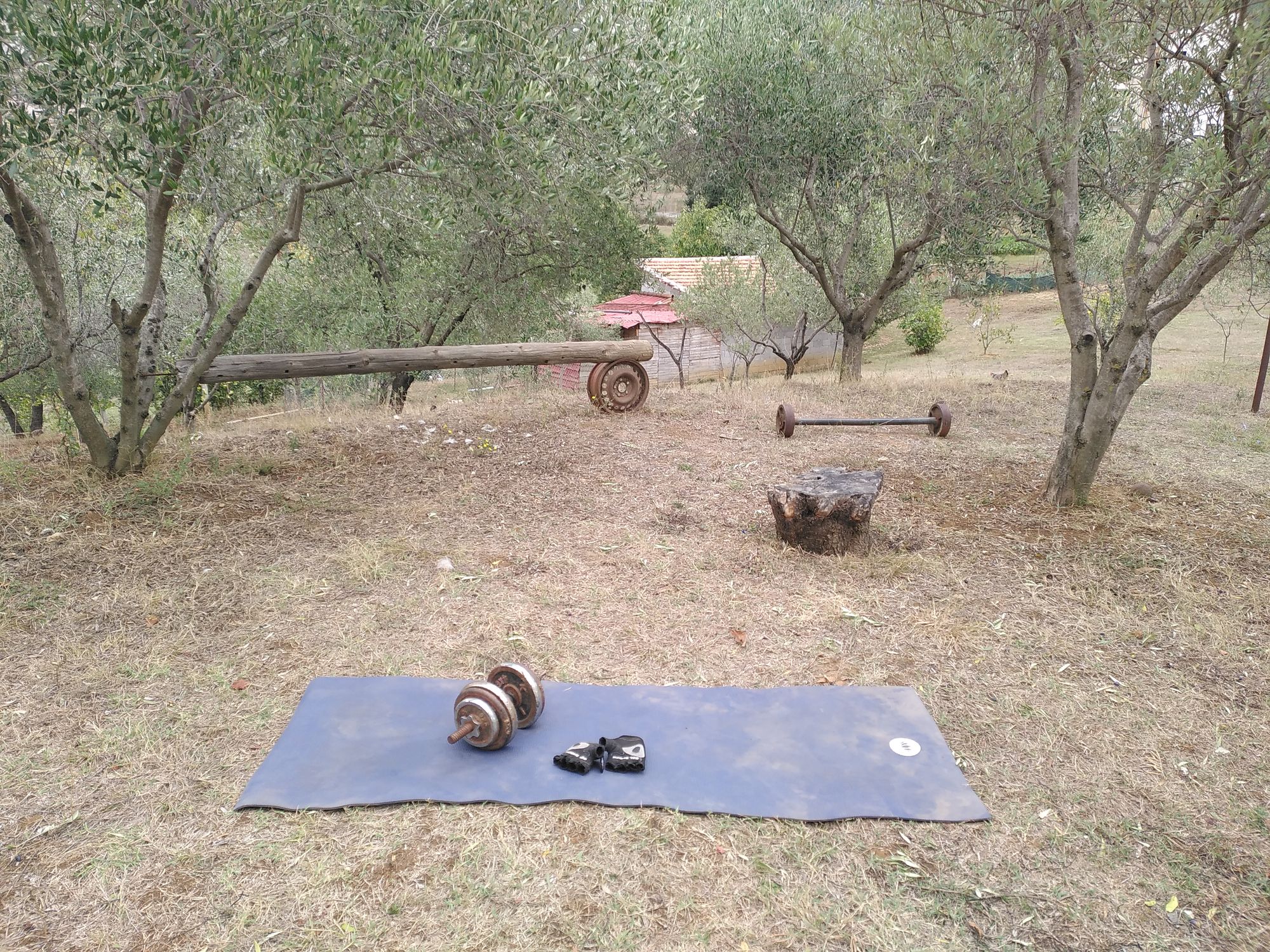
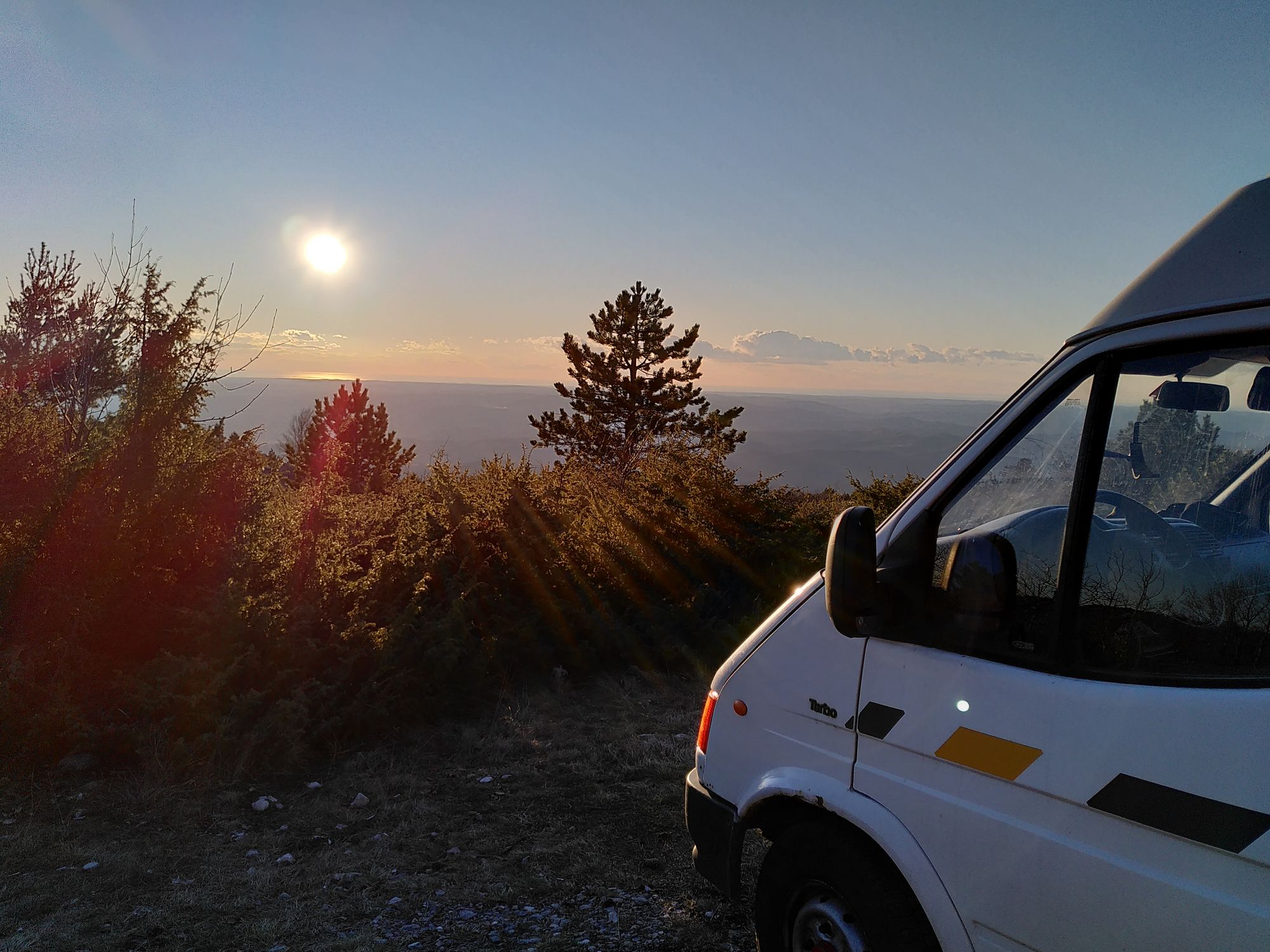
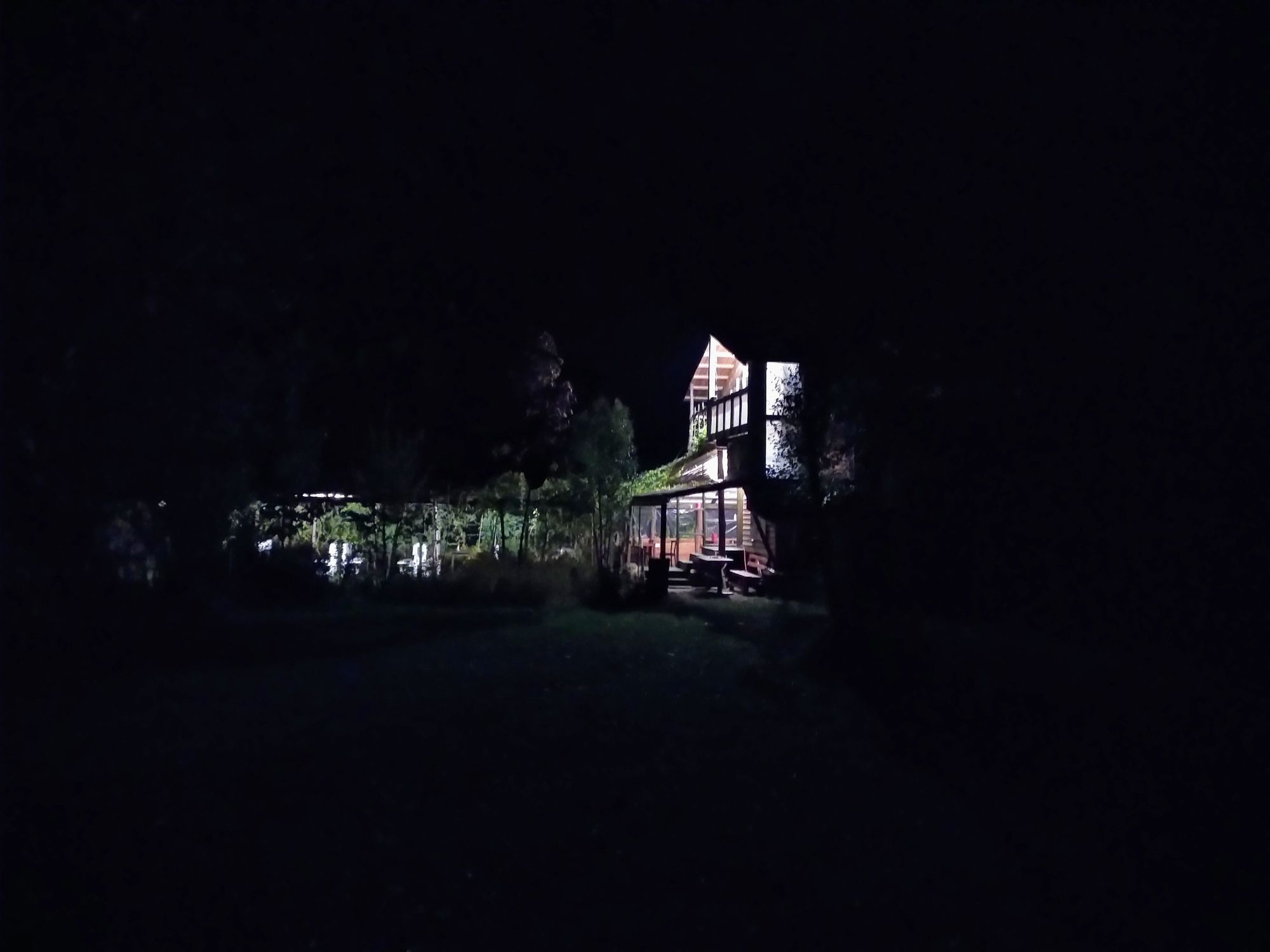
Comments
Write a comment ...